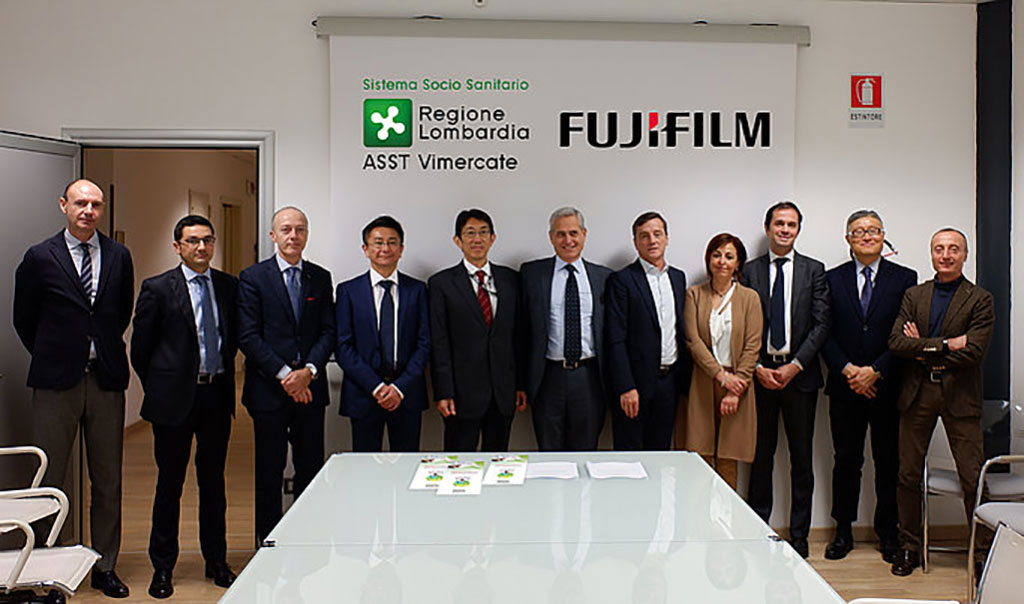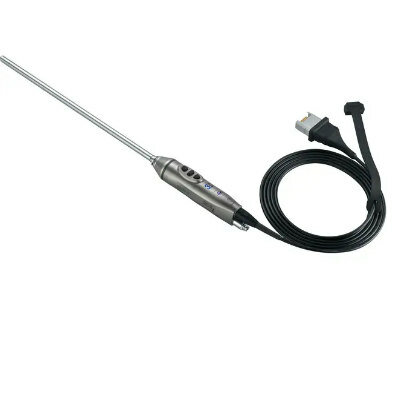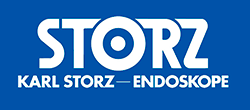Fujifilm’s AI Platform, REiLI Chosen by ASST Vimercate Hospital to Support Operators in Fight Against COVID-19
|
By HospiMedica International staff writers Posted on 03 Jul 2020 |

Image: Fujifilm’s AI Platform, REiLI Chosen by ASST Vimercate Hospital to Support Operators in Fight against COVID-19 (Photo courtesy of Fujifilm Medical Systems)
Amidst the COVID-19 emergency, ASST Vimercate Hospital (Vimercate MB, Italy) has chosen and implemented Fujifilm Medical Systems’ (Tokyo, Japan) Artificial Intelligence (AI) platform, REiLI.
REiLI’s processing of CT scans and chest X-rays provides important support for radiologists, offering them an extremely rapid, quantitative and objective assessment of the various zones of the lungs. The chest X-ray, in particular, is the best example of applying the new AI technology, in that it is a quick and simple examination which provides a large amount of useful information for evaluating the presence of the pulmonary parenchymal consolidation caused by the virus. The data obtained from AI does not replace either the molecular diagnoses performed using the nasopharyngeal swab (RT-PCR) or the precious analyses and diagnoses performed by radiologists. The data, however, does provide support in reporting on daily examinations conducted to monitor and study the development of the disease, and constitute a second opinion for the operators. REiLI, Fujifilm’s AI platform, is integrated with the Lunit Insight CXR module for the analysis and detection of the main types of pulmonary disease (nodules, atelectasis, fibrosis, calcifications, cardiomegaly, etc.). In fact, the Lunit Insight CXR3 module has been updated to provide support in specifically identifying the pulmonary parenchymal consolidation caused by the virus.
During the novel coronavirus emergency, operations and workflows in all Italian hospitals were disrupted, which significantly increased workloads. As a consolidated partner of ASST Vimercate, Fujifilm wanted to ensure that its cutting-edge tools were available to reduce the impact caused by the rapid spread of COVID-19 and to deliver a timely response to the spread of the pandemic. In November 2019, ASST Vimercate and Fujifilm signed an agreement to explore new approaches for the treatment of patients, with benefits both the clinical services and healthcare operators. REiLI was installed at ASST Vimercate in just two weeks, by installing a parallel PACS to avoid interrupting the daily workflow. On March 30, REiLI was already operational and had worked on more than 600 images during its first five days. During the emergency, more than 900 positive cases of COVID-19 were found, with an average of 80 chest X-rays per day, allowing for precise and punctual data collection.
“REiLI's support has allowed our radiologists to report examinations with greater speed and efficiency,” said Marcello Intotero, Head of Radiology Structure and Diagnostic Services Department, ASST Vimercate. “In numerical terms, their workloads have not particularly increased, as other causes for non-urgent examinations were limited to avoid an excess flow of patients. This new technology has given great support to the workflow; all images that AI identified as suspected COVID-19 were subjected to processing by the radiologist in a faster and more urgent manner than other images which, instead, the system analyzed as corresponding to a healthy lung.”
“During the health emergency, more than 80 chest X-rays of inpatients and first-aid patients have been analysed each day at the Vimercate Hospital,” said Giovanni Delgrossi, Head of IT Department, ASST Vimercate. “If no priority is set for the examinations to be reported, it may take hours to identify a particular X-ray which could require prompt, immediate action from doctors. In an emergency like the current one, we need to react and act even more quickly.”
“Alternative Intelligence is a new operating concept projected towards collaborative intelligence between machine and man,” said Nicola Bilibio, Clinical Specialist Medical Informatics (CSE) Fujifilm Europe GmbH. “This is a fundamental tool for optimizing the workflow and for screening patients from COVID-19. During the emergency, we promptly made our most advanced technologies available to make our concrete contribution to the crisis.”
REiLI’s processing of CT scans and chest X-rays provides important support for radiologists, offering them an extremely rapid, quantitative and objective assessment of the various zones of the lungs. The chest X-ray, in particular, is the best example of applying the new AI technology, in that it is a quick and simple examination which provides a large amount of useful information for evaluating the presence of the pulmonary parenchymal consolidation caused by the virus. The data obtained from AI does not replace either the molecular diagnoses performed using the nasopharyngeal swab (RT-PCR) or the precious analyses and diagnoses performed by radiologists. The data, however, does provide support in reporting on daily examinations conducted to monitor and study the development of the disease, and constitute a second opinion for the operators. REiLI, Fujifilm’s AI platform, is integrated with the Lunit Insight CXR module for the analysis and detection of the main types of pulmonary disease (nodules, atelectasis, fibrosis, calcifications, cardiomegaly, etc.). In fact, the Lunit Insight CXR3 module has been updated to provide support in specifically identifying the pulmonary parenchymal consolidation caused by the virus.
During the novel coronavirus emergency, operations and workflows in all Italian hospitals were disrupted, which significantly increased workloads. As a consolidated partner of ASST Vimercate, Fujifilm wanted to ensure that its cutting-edge tools were available to reduce the impact caused by the rapid spread of COVID-19 and to deliver a timely response to the spread of the pandemic. In November 2019, ASST Vimercate and Fujifilm signed an agreement to explore new approaches for the treatment of patients, with benefits both the clinical services and healthcare operators. REiLI was installed at ASST Vimercate in just two weeks, by installing a parallel PACS to avoid interrupting the daily workflow. On March 30, REiLI was already operational and had worked on more than 600 images during its first five days. During the emergency, more than 900 positive cases of COVID-19 were found, with an average of 80 chest X-rays per day, allowing for precise and punctual data collection.
“REiLI's support has allowed our radiologists to report examinations with greater speed and efficiency,” said Marcello Intotero, Head of Radiology Structure and Diagnostic Services Department, ASST Vimercate. “In numerical terms, their workloads have not particularly increased, as other causes for non-urgent examinations were limited to avoid an excess flow of patients. This new technology has given great support to the workflow; all images that AI identified as suspected COVID-19 were subjected to processing by the radiologist in a faster and more urgent manner than other images which, instead, the system analyzed as corresponding to a healthy lung.”
“During the health emergency, more than 80 chest X-rays of inpatients and first-aid patients have been analysed each day at the Vimercate Hospital,” said Giovanni Delgrossi, Head of IT Department, ASST Vimercate. “If no priority is set for the examinations to be reported, it may take hours to identify a particular X-ray which could require prompt, immediate action from doctors. In an emergency like the current one, we need to react and act even more quickly.”
“Alternative Intelligence is a new operating concept projected towards collaborative intelligence between machine and man,” said Nicola Bilibio, Clinical Specialist Medical Informatics (CSE) Fujifilm Europe GmbH. “This is a fundamental tool for optimizing the workflow and for screening patients from COVID-19. During the emergency, we promptly made our most advanced technologies available to make our concrete contribution to the crisis.”
Latest Health IT News
- Printable Molecule-Selective Nanoparticles Enable Mass Production of Wearable Biosensors
- Smartwatches Could Detect Congestive Heart Failure
- Versatile Smart Patch Combines Health Monitoring and Drug Delivery
- Machine Learning Model Improves Mortality Risk Prediction for Cardiac Surgery Patients
- Strategic Collaboration to Develop and Integrate Generative AI into Healthcare
- AI-Enabled Operating Rooms Solution Helps Hospitals Maximize Utilization and Unlock Capacity
- AI Predicts Pancreatic Cancer Three Years before Diagnosis from Patients’ Medical Records
- First Fully Autonomous Generative AI Personalized Medical Authorizations System Reduces Care Delay
- Electronic Health Records May Be Key to Improving Patient Care, Study Finds
- AI Trained for Specific Vocal Biomarkers Could Accurately Predict Coronary Artery Disease
Channels
Critical Care
view channel
Ingestible Smart Capsule for Chemical Sensing in the Gut Moves Closer to Market
Intestinal gases are associated with several health conditions, including colon cancer, irritable bowel syndrome, and inflammatory bowel disease, and they have the potential to serve as crucial biomarkers... Read moreNovel Cannula Delivery System Enables Targeted Delivery of Imaging Agents and Drugs
Multiphoton microscopy has become an invaluable tool in neuroscience, allowing researchers to observe brain activity in real time with high-resolution imaging. A crucial aspect of many multiphoton microscopy... Read more
Novel Intrabronchial Method Delivers Cell Therapies in Critically Ill Patients on External Lung Support
Until now, administering cell therapies to patients on extracorporeal membrane oxygenation (ECMO)—a life-support system typically used for severe lung failure—has been nearly impossible.... Read moreSurgical Techniques
view channel
Pioneering Sutureless Coronary Bypass Technology to Eliminate Open-Chest Procedures
In patients with coronary artery disease, certain blood vessels may be narrowed or blocked, requiring a stent or a bypass (also known as diversion) to restore blood flow to the heart. Bypass surgeries... Read more
Intravascular Imaging for Guiding Stent Implantation Ensures Safer Stenting Procedures
Patients diagnosed with coronary artery disease, which is caused by plaque accumulation within the arteries leading to chest pain, shortness of breath, and potential heart attacks, frequently undergo percutaneous... Read more
World's First AI Surgical Guidance Platform Allows Surgeons to Measure Success in Real-Time
Surgeons have always faced challenges in measuring their progress toward surgical goals during procedures. Traditionally, obtaining measurements required stepping out of the sterile environment to perform... Read morePatient Care
view channel
Portable Biosensor Platform to Reduce Hospital-Acquired Infections
Approximately 4 million patients in the European Union acquire healthcare-associated infections (HAIs) or nosocomial infections each year, with around 37,000 deaths directly resulting from these infections,... Read moreFirst-Of-Its-Kind Portable Germicidal Light Technology Disinfects High-Touch Clinical Surfaces in Seconds
Reducing healthcare-acquired infections (HAIs) remains a pressing issue within global healthcare systems. In the United States alone, 1.7 million patients contract HAIs annually, leading to approximately... Read more
Surgical Capacity Optimization Solution Helps Hospitals Boost OR Utilization
An innovative solution has the capability to transform surgical capacity utilization by targeting the root cause of surgical block time inefficiencies. Fujitsu Limited’s (Tokyo, Japan) Surgical Capacity... Read more
Game-Changing Innovation in Surgical Instrument Sterilization Significantly Improves OR Throughput
A groundbreaking innovation enables hospitals to significantly improve instrument processing time and throughput in operating rooms (ORs) and sterile processing departments. Turbett Surgical, Inc.... Read moreHealth IT
view channel
Printable Molecule-Selective Nanoparticles Enable Mass Production of Wearable Biosensors
The future of medicine is likely to focus on the personalization of healthcare—understanding exactly what an individual requires and delivering the appropriate combination of nutrients, metabolites, and... Read more
Smartwatches Could Detect Congestive Heart Failure
Diagnosing congestive heart failure (CHF) typically requires expensive and time-consuming imaging techniques like echocardiography, also known as cardiac ultrasound. Previously, detecting CHF by analyzing... Read moreBusiness
view channel
Expanded Collaboration to Transform OR Technology Through AI and Automation
The expansion of an existing collaboration between three leading companies aims to develop artificial intelligence (AI)-driven solutions for smart operating rooms with sophisticated monitoring and automation.... Read more

















